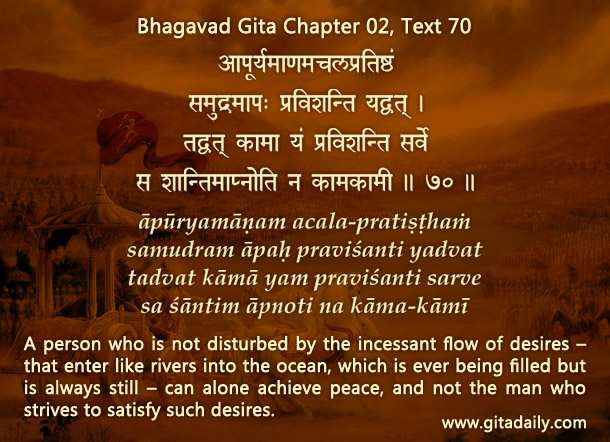When we make resolutions for self-mastery, we are often thwarted by our emotions and desires.
Emotions are largely reactive, arising from the things we perceive in the outer world. In contrast, desires are largely active, impelling us to do something in the world. Pertinently, the Bhagavad-gita (02.70) states that the wise don’t let the inflow of enjoyable-seeming sensory stimuli trigger the outflow of desires for sensual enjoyment — they don’t let those worldly emotions become worldly desires.
Because emotions are situational, they can be difficult to control. Suppose we are walking on a road and see a cupcake in a bakery. We may immediately feel the emotion of pleasure.
Because desires arise from inside, they are much more in our power to generate and direct. Suppose when we see the cupcake, we are walking, driven by a strong desire to urgently meet an important person. We may still feel pleasure on seeing the cupcake, but we will check that emotion’s growth into the desire to eat the cake using the power our other strong desire.
What happens when we don’t differentiate between emotions and desires? Whenever an unhealthy emotion rises within us against our will, we mistakenly think that we lack any willpower, though we may still have enough willpower to prevent that emotion from growing into an unhealthy desire. Because of our misunderstanding, we may cave in even when we don’t need to.
Instead of getting worked up over any unwanted emotions we may circumstantially feel, we can work on cultivating healthier desires and let those desires drive us toward self-mastery.
One-sentence summary:
Emotions are reactive, whereas desires are active — even if we can’t prevent unhealthy emotions from rising within us, we can prevent them from growing into unhealthy desires by cultivating other, healthier desires.
Think it over:
- How are desires different from emotions?
- What happens when we don’t understand this difference?
- How can you use this understanding in your pursuit of self-mastery?
***
02.70: A person who is not disturbed by the incessant flow of desires – that enter like rivers into the ocean, which is ever being filled but is always still – can alone achieve peace, and not the man who strives to satisfy such desires.


Hare Krishna
Very nice explanation – differentiation. Thank you very much prabhu ji. 🙏
Thanks, happy to be of service.